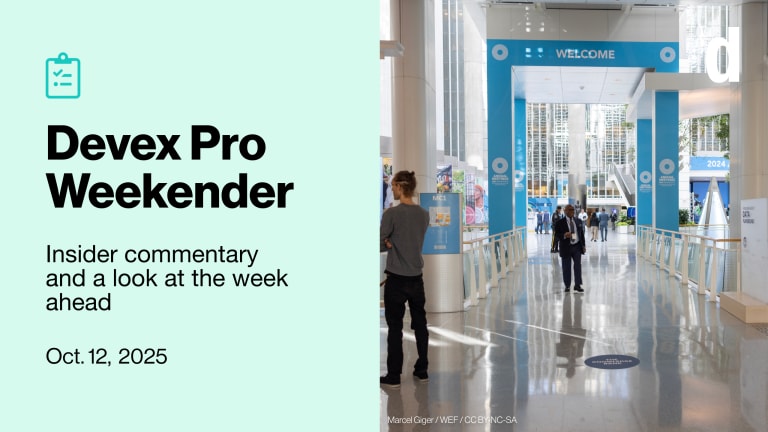
The World Bank looks for more money, the Rohingya crisis worsens, Kenya returns to the polls (maybe), and Trump pulls the U.S. out of UNESCO. This week in development.
The World Bank Annual Meetings are in full swing, with discussions ranging from the specifics of the multilateral development bank's financial position, to big questions about how to generate trillions in financing for the Sustainable Development Goals. One of World Bank President Jim Yong Kim's primary tasks this week is to extract some kind of favorable commitment from the bank's shareholders to grant the institution more capital so it can do more lending in more places. The U.S. government remains one of Kim's biggest obstacles, with skeptics inside the U.S. Treasury objecting to the bank's engagement with competitor economies such as China. On other fronts, the bank's 2018 World Development Report, released last month, has framed some heated debate around the global learning crisis, how international financial institutions should support quality education, and whether the balance of funding for public versus private solutions ought to shift. As the World Bank has looked for new tools to leverage its own money in pursuit of private sector dollars, some civil society groups have worried the institution’s oversight mechanisms — such as the World Bank Inspection Panel — might be diluted. The World Bank’s board of executive directors has initiated a review of the Inspection Panel, aimed at ensuring its tools align with the demands of a changing project finance and implementation picture. This weekend the bank's Development Committee, made of up finance ministers from around the world, will meet to discuss the institution's direction and future.
Half a million Rohingya have fled a violent and protracted military crackdown in Myanmar’s Rakhine state to Bangladesh since late August, joining an estimated 300,000 already living in camps in the area. The combined population of new arrivals and pre-existing Rohingya camps — more than 800,000 — will soon be larger than the population of San Francisco. The conditions in Bangladesh’s Cox’s Bazar district, a hilly region prone to landslides and about to enter cyclone season, have presented unique challenges for aid distribution. Aid efforts are also hampered by slow authorization for NGOs, with medicine and shelter supplies stuck in offices and staff grounded. The situation is particularly troubling for children, who make up nearly 60 percent of the 520,000 Rohingya who have fled Myanmar. As Devex East Asia Correspondent Kelli Rogers reported today, most are now living in squalid conditions in 20-plus makeshift camps so sprawling they are equivalent to the size of 889 football fields. The World Bank announced support for Bangladesh, including expanding access to health, education, water, sanitation, and roads; but the amount of financial support is yet to be determined.
To mark International Day of the Girl Child, policymakers and activists gathered in Brussels to discuss some of the biggest barriers to girls’ well-being, such as teen pregnancy, sexual and gender-based violence, child marriage, and school dropout rates. A report from ONE detailed stark gender gaps in education worldwide: just two of the 10 countries where it is hardest for girls to get an education — including South Sudan, the Central African Republic, and Niger — are meeting the target set by the Global Partnership for Education of spending 20 percent of the national budget on education. Meanwhile, education’s share of official development assistance has dropped from 13 percent to 10 percent since 2002. Over in D.C. at the World Bank Annual Meetings, Oxfam CEO Winnie Byanyima was asked for her advice to tackle gender inequality in education: “World Bank, stop funding low-cost private schools. They are not a success story. What works is quality public education for our kids.”
Kenya’s electoral body is stumped at how to proceed after presidential candidate Raila Odinga withdrew from the nation’s re-run election, scheduled for October 26. The Supreme Court ruled that the August election, where incumbent Uhuru Kenyatta was re-elected, was “invalid, null and void” and ordered a repeat ballot. Odinga in a statement released on Oct. 10 said that his political party, the National Super Alliance, provided the electoral body with a checklist of changes that needed to happen in order for the election to be “free and fair,” but said that these changes have not taken place. In response, the Independent Electoral and Boundaries Commission, the nation’s electoral body, noted that Odina has not yet submitted correct paperwork to withdraw. You can find more of Devex’s election coverage here.
The Social Capital Markets conference in San Francisco is looking at how to progress the SDGs, beyond traditional aid. Achim Steiner, administrator of the United Nations Development Programme, called the SDGs a declaration of interdependence when he took the stage Wednesday to discuss the role of impact investing in achieving the goals by 2030. Several sessions at SOCAP are evaluating the state of the field of impact investing. Devex sat down with Fran Seegul, head of the U.S. Impact Investing Alliance, who said that while it is easy to measure the growth of impact investing in terms of dollars, the sector must develop better ways to measure the impact that has resulted. Yesterday, Devex attended sessions on gender lens investing, failing at scaling, and exponential technologies, and today the focus will shift to blended finance, accelerator models at NGOs, and moving from aid to investment. Follow and send questions to our West Coast Correspondent Catherine Cheney, who is speaking with investors and entrepreneurs, and stay tuned for a Facebook Live recap Friday at 1:00 p.m. EST.
On World Sight Day, new research reveals almost completely stagnant progress in the fight against the leading causes of vision loss in low- and middle-income countries. While treatment for cataracts and other forms of ocular degeneration are available in the industrialized world, prevalence of curable and preventable eye diseases among those aged 50-plus in the developing world hasn't changed in 30 years, according to research from the Vision Loss Expert Group. Two-thirds of the world's blind are women, and experts predict that given the global aging population, the number of blind individuals will triple by 2050, without greater intervention from governments and aid donors. Two new financing mechanisms aim to inject private capital and creativity into reducing preventable blindness in developing countries.
The Trump administration announced plans to withdraw from UNESCO, citing financial reasons and an anti-Israel bias. The U.S. helped establish UNESCO after World War II, but has had a rocky relationship with the U.N. organization in recent years. The United States stopped paying its dues in 2011 after UNESCO voted to include Palestine as a member, which resulted in UNESCO revoking America’s vote in 2013.
Join the Devex community and access more in-depth analysis, breaking news and business advice — and a host of other services — on international development, humanitarian aid and global health.








